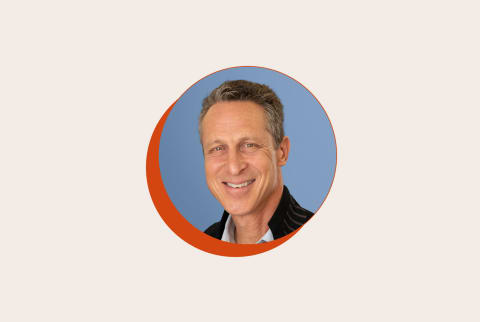Advertisement
Here Are A Functional MD's 3 New Rules For Aging Backward


It's an exciting time for the longevity space. With new research and technologies emerging every single day, it's never been easier to take control of your health span. Longevity science is always evolving, and our own routines should reflect the shifting tides.
It's easy to become dogmatic, but if you really want to reduce your biological age, you might want to approach it with a little more flexibility.
On this episode of the mindbodygreen podcast, functional medicine doctor Mark Hyman, M.D., author of Young Forever: The Secrets to Living Your Longest, Healthiest Life, discusses how his healthy aging routine has evolved over the years—the "new rules" of longevity, if you will. Below, find his updated nonnegotiables:
Resistance training is crucial
"I used to be the guy who rode my bike 100 miles a day," Hyman recounts. "I'll still go out for a couple-hour [long] bike ride, but what's become more and more clear to me is that if you don't understand how to build muscle, how to improve your mitochondrial number and function, you will age faster."
Muscle mass is crucial for longevity, period and full stop. Having low muscle mass has previously been associated with an increased risk of cognitive decline1, insulin resistance2, and high inflammatory markers3. Muscle-strengthening activities, however, have been shown to reduce mortality risk by 10 to 17%4.
"It can be bands, it can be weights, it can be all sorts of things that you can do, but resistance training is so essential to stimulate muscle synthesis, mitochondrial biogenesis, and improving function," adds Hyman.
That's not to say you shouldn't ever do cardio—just make sure you add some sort of strength training to the rotation. "I think you need both," says Hyman. See here for our full guide to strength training, with some example moves you can follow.
Get enough protein
On the subject of muscle mass, we can't forget about protein. Protein is a building block of muscle, and it's critical for optimal energy, immunity, metabolic function, musculoskeletal health, hormonal balance, recovery, and more.
Now, a growing number of health and nutrition experts are encouraging people to go beyond the RDA5 and increase protein intake—including Hyman.
"You see people who don't understand the science of protein [are] very frail, and frailty is a risk factor for early death6, falls, and sarcopenia," he says. "Now, if you want to be vegan, that's OK, but you have to understand what you're doing and how to stay out of trouble."
You see, not all protein is created equal. Plant proteins tend to have a lower content of the amino acid leucine, which is considered the most important for muscle protein synthesis7. "Let's say you want to get 120 grams [of protein], which is really what you should be getting, you need to eat 31,000 calories and 24 cups of brown rice. Now that just doesn't make any sense," he explains.
"I don't think that eliminating animal protein, unless you are willing to be really stringent about your protein intake and have processed plant protein powders with added amino acids, [puts you] in good shape."
Of course, if you do eat animal proteins, you'll want to make sure that you're consuming high-quality, grass-fed sources, if you can. "I think having the right amount and the right kind of protein at the right time is really important," Hyman adds.
Focus on sleep
OK, we've been talking about the sleep-longevity connection for a while now—it's not necessarily a "new rule" of increasing health span. Still, it bears repeating, according to Hyman.
"Sleep is a time of repair, renewal, rebuilding, and a time of autophagy," he shares. "Short-changing yourself on sleep and not focusing on the quality of your sleep is going to accelerate aging across the board."
Short sleep duration (less than seven hours) is even associated with shorter telomeres8, with five hours being especially risky. Make sure you have a solid wind-down routine and perhaps invest in a natural sleep aid, if you need an extra nudge.
The takeaway
Increasing health span doesn't require a gigantic routine overhaul; in fact, most of Hyman's tips are actually quite straightforward. Get good, quality sleep, focus on muscle mass, and make sure you eat enough protein—three simple rules we can all agree on, don't you think?
We hope you enjoy this episode! And don't forget to subscribe to our podcast on iTunes, Google Podcasts, Spotify, or Amazon Music!
8 Sources
- https://jamanetwork.com/journals/jamanetworkopen/fullarticle/2793806
- https://www.nature.com/articles/s41366-020-0590-y
- https://www.sciencedirect.com/science/article/pii/S1568163720303202?via%3Dihub
- https://pubmed.ncbi.nlm.nih.gov/35228201/
- https://www.ncbi.nlm.nih.gov/pmc/articles/PMC5347101/
- https://www.cdc.gov/mmwr/volumes/67/wr/mm6718a1.htm?s_cid=mm6718a1_w
- https://www.ncbi.nlm.nih.gov/pmc/articles/PMC5096790/
- https://journals.plos.org/plosone/article?id=10.1371/journal.pone.0047292